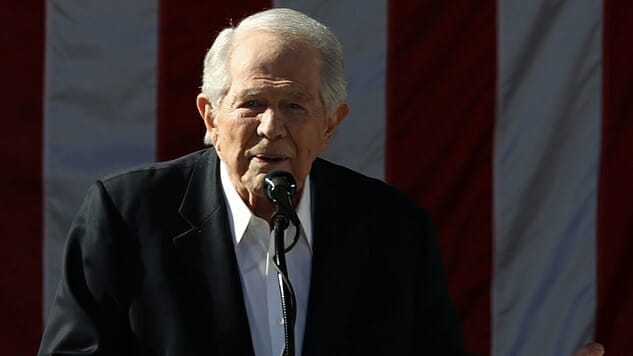Famed Evangelical Christian: We Can’t Let the Murder of a Dissident Get in the Way of a Good Arms Deal
Photo by Win McNamee/Getty
Siri, please show me the perfect distillation of Republican evangelical Christianity in America.
(Per Vox):
”For those who are screaming blood for the Saudis — look, these people are key allies,” [Pat] Robertson said. While he called the faith of the Wahabists — the hardline Islamist sect to which the Saudi Royal Family belongs — “obnoxious,” he urged viewers to remember that “we’ve got an arms deal that everybody wanted a piece of…it’ll be a lot of jobs, a lot of money come to our coffers. It’s not something you want to blow up willy-nilly.”
Jesus is quite literally history’s most famed pacifist, yet one of the most prominent evangelicals in America believes that massive arms deals are too important to let little things like torturing, murdering and dismembering political dissenters get in the way. If you didn’t know anything about evangelical Christianity in American politics, you would think that a man who worships someone that was murdered by the state for their opposing views would have immense sympathy for Jamal Khashoggi—the Saudi Arabian journalist murdered by the state for his opposing views.
Pat Robertson may sound like a kook (and he is), but he has immense power—as evangelical Christian scholar, Berny Belvedere wrote at Quillette:
A precondition for conservative Christian mobilization is the remarkable durability of the religious traditionalist’s mindset. Religious traditions can be impossibly stubborn things—adherents appreciate that they preserve ancient truths and practices, while detractors lament their frustrating unwillingness to modernize. Whether you like this feature or hate it, worldview consolidation is what enables Christian conservatism to remain a predictable movement. Despite the apocalyptic warnings on the Right about the society-dissolving acids of identity politics, conservative Christians are a bloc that votes largely in unison. What makes this possible is that conservative Christianity’s narrow set of values and beliefs get converted into a rigid set of political pursuits and goals.
But since Christian conservatism is built to withstand pressures to adapt, it becomes susceptible to all kinds of grifters and status-seekers. In many ways, belief consolidation sets up the perfect scam: Opportunists seeking fame and wealth can find in Christian conservatism a system that doesn’t require of its leaders continual reinvention—you master a fixed set of values and beliefs and let charisma do the rest.
…
Some conservative Christian personalities, such as the megachurch pastor, are locally significant; others, such as Pat Robertson and Franklin Graham, are nationally renowned. Every single one of them has a set of believers whose views they greatly influence and impact. This last point is significant. Above I wrote as though conservative Christians build their views independently of their teachers and leaders, as though these charismatic personalities only win the approval of conservative Christians by parroting back to them their antecedently-held beliefs. The dynamic is actually more complicated than that.
Belvedere goes on to detail how Trump became the standard bearer for Republican evangelicals, but all you really need to understand that dynamic is to see how their views have changed on immorality from Obama to Trump.
https://t.co/fA4JXLU2Vepic.twitter.com/JYCKs1MSIe
— Best Posts (@onlygoodposts1) October 23, 2018
There are two types of evangelical Christians in America: actual evangelical Christians who heed Jesus’s teachings of love, peace and compassion for the downtrodden, and far-right Republicans who have deluded themselves into thinking that their politics are a religion—to the point where they’re supporting the spread of war and desolation because jobs. It’s high time that we start delineating between the two, lest immensely powerful people with fringe beliefs like Pat Robertson completely take over the term evangelical Christian for good.
Jacob Weindling is a staff writer for Paste politics. Follow him on Twitter at @Jakeweindling.